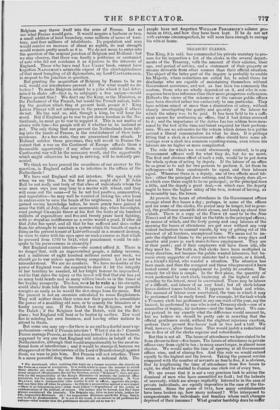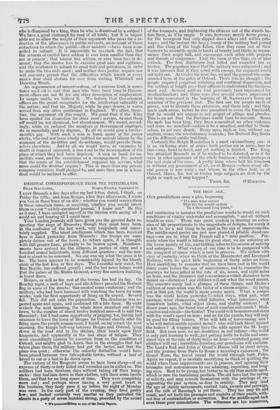TREASURY CLERKS.
THE King, it is said, has commanded his private secretary to pro- cure for his inspection a list of the clerks in the several depart- runts of the Treasury, with the amount of their salaries, their age, and period of service, and a statement of their property or income derivable from other sources than their official-situation.
The object of the latter part of the inquiry is probably to enable his Majesty, where reductions are called for, to select those for discharge who are capable of maintaining themselves without Government assistance, and not, as has been too commonly the custom, those who are wholly dependent on it, and who in con- sequence have less influence than their more prosperous colleagues. Hitherto the views of the reformers of the various public offices have been directed rather too exclusively to one particular. They have seldom aimed at more than a diminution of salaiy, witheut closely investigating the qiielity and quentity of the labour for which the salary was to be paid. It has been held to be a suffi- cient excuse for continuing an office, that it had duties annexed to it ; and the importance of the duties has trio seldom been mea- • sured by the test of the time and talent required for their perform- ance. We are no advocates for the reform which denies to a public servant a liberal remuneration for what he does. It is perhaps fitting that a clerk in a Government office should have some ad- vantage over a clerk in a common counting-room, even where his labours are no higher or more complicated.
The rule for which we would strenuously contend, is to pay Government officers well for what they do, but for no more. The first and obvious effect of such a rule, would be to put down the whole system of acting by deputy. If the labour of an office be so great as to call for two persons to perform it, let them be colleagues—let their emoluments be equal, and their labours equal. Wherever there is a deputy, one of two effects must fol- low: either the principal does nothing, and the deputy does all,— in which case there ought to be no principal ; or the principal does a little, and the deputy a great deal,—in which case the deputy ought to have the higher salary of the two, instead of having, as he invariably -has, the lower.
At present, the hours of attendance in the Government offices average about five hours a day ; perhaps, in some of the offices and for some of the clerks, the period may be longer, but in gene- ral, the gentlemen assemble about eleven, and break up about four o'clock. There is a copy of the Times (it used to be the New Times) and of the Courier laid on the table in the principal offices; by means of which, and the lively gossip and easy labours of the morning the hours of attendance are got over without any very violent inclination to commit suicide, by way of getting rid of the heaviest of all burdens, unemployed time. We mean not to im- pute the slightest blame to the persons who trifle away days and months and years in such make-believe employment. They are at their posts ; and if their employers will have them idle, idle they must be. The truth is, that clerks have been multiplied itt every direction, not because the public wanted labourers, but be- cause every supporter of every minister had a cousin, or a friend, or a friend's friend, who wanted a situation. The situation has been made, and then the occupant and those who procured it have looked round for some employment to justify its creation. The remedy for all this is simple. In the first place, the quantity of work performed by each clerk, beginning at the highest and de- scending to the lowest, must be ascertained. There may be labour of a difficult, and labour of an easy kind ; but all clerk-labour leaves distinct traces behind it. It appears in black and white. The amount of labour once ascertained, the time in which it may be performed will be easily found. For example, let the task which a Treasury clerk has performed in any one week of the year, say the busiest, be performed by one who is not a Treasury clerk—one of a committee of inquiry, for instance—and the time noted. We can- -not pretend to say exactly what the difference would amount to, but we believe we should be pretty safe in asserting that the official gentlemen could, without the slightest injurious exertion, perform their present five-hours' task in two and a half. We however, allow them four. This would justify a reduction of one in five of all the clerks superior and subordinate.
But this is not all. The hours of attendance we have stated to be from eleven to four—five hours. The hours of attendance in private offices vary from eight to ten ; in many cases longer, in almost none shorter. We would make the time of opening at all Government offices nine, and of closing five. And this rule we would extend equally to the highest and the lowest. Taking the present service compared with the number of servants as four to five, it is obvious, that by lengthening the time of attendance from five hours to eight, we shall be enabled to dismiss one clerk out of every two.
We are aware that it is not a very gracious task to advise the dismissal of men who have committed no fault ; but the behests of necessity, which are always implicitly listened to in the case of private individuals, are equally imperative in the case of the Go- vernment. Since the peace of 1815, how many establishments have been broken up, how • many reduced ? _ Who interposed to compassionate the individuals and families whom such changes. deprived of their incomes ? What greater hardship does he stiffer who is dismissed by a king, than he who is dismissed by a subject ? • We have a great contempt for cant of all kinds; but it is impos- sible not to allow the weight of their argument who press for a re- duction of the allowances to public servants, on account of those reductions to which the public—their masters —have been com- pelled to submit. It is impossible to overlook the fact, that the returns of capital have seldom if ever been smaller than they are at present ; that labour has seldom or ever been less in de- mand; that the master has to exercise.great care and vigilance, and the workman to submit to great toils and privations, in order to make the two ends meet ; and neither does justice require nor will necessity permit that the difficulties which knock at every man's door shall abstain for ever from visiting Whitehall and Downing Street.
An argumentum ad misericordiarn, of a curious kind, is some- times used—it is said that men who have been long in Govern- ment offices are not fit for any other description of employment. In simple sooth, we believe it. We believe that Government offices are the grand receptacles for the intellectual imbecility of the nation ; and that his Majesty, while he pays dearer, is worse served than any other gentleman in England. We allow, there- fore, the argument all -due weight. We grant that if the King have spoiled his domestics for other men's service, to cast them off' would be, not dismissal, but abandonment. We would, accord- . ingly, while we reduced the numbers of Government employes, do so mercifully, and by degrees._ To all we would give a twelve- month's pay. With such a sum in hand, many of the junior clerks, who had not been wholly unfitted for serious labour by the company of the do-littles and do-nothings, would provide them- selves elsewhere. And to all we would leave, as vacancies by death or removal occurred, a free road to the reoccupation of the place of which they had been deprived. A sum in hand for im- mediate want, and the assurance of a reengagement the instant that the wants of the establishment required his service, what more could the destitue require ? This is more than any private company considers itself pledged to, and more than one in a hun- dred would be inclined to offer.



























 Previous page
Previous page